An IPADS PhD student conducting agricultural research at the Complex Systems Institute in Paris, France as a visiting scholar
“Agriculture should be a steady and sophisticated process, with practical applications, to connect the world.”
ABOUT
Charles Lin is a 2nd year IPADS PhD student, and a native of Taiwan. He is under the supervision of Professor Masaru MIZOGUCHI in the International Agro Informatics Laboratory. His expertise includes human-computer interactions (HCI) as well as industrial design. After earning a master’s degree in Media Design from Keio University, he moved to the agricultural sciences field due to concerns about food safety. Charles says, “when it comes to Taiwan, it’s always about food. However, compared to the situation worldwide, we don’t have a well-designed value chain.”
He has observed the very chaotic situation that industries face; the many labels or logos made to convince consumers, may also confuse them. He continues, “many standards are created to add value to products. However, this makes food more expensive. Access to safe and good quality food should not be a privilege, it should be universal.”
Charles is now a visiting scholar at the French National Centre for Scientific Research (CNRS) in Paris, conducting his research under the Institute of Complex Systems (ISC-PIF). This CNRS unit is dedicated to the development of inter-institutional and interdisciplinary research on complex systems.
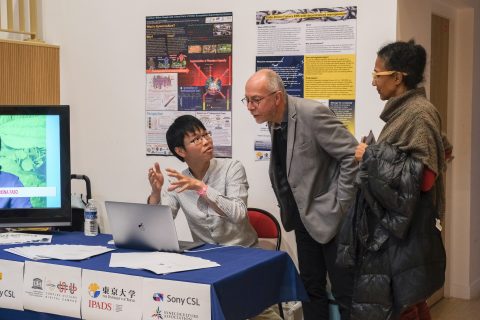
<Charles participated in a CNRS open event to introduce his research to the public>
RESEARCH
His research work at CNRS is focused on developing supportive measures and operational frameworks for Illegal, Unreported, and Unregulated Fishing (IUU) and overfishing prevention, in the context of small and coastal fisheries. His work also includes developing traceability systems for risk communication and value exchange for the supply chain. Charles points out:
“Asian fishery systems operate differently, from the EU or the US. Rather than governmental control, the system is closed and operated locally, with respect to regional factors. In addition, there is a culture to maintain a social system in local areas, although at a much smaller scale, which might not be economically efficient when used with diverse fish species. The challenge is to strike a balance between precise catch documentation, with regard to trade and traceability, while using a more simple and user-friendly system, especially for small holders in Asia.”
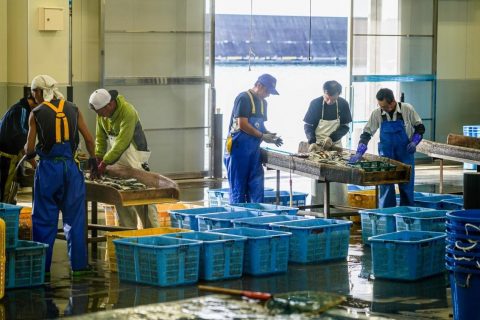
<Yui harbor in Shizuoka, Japan, where Charles conducted his previous fieldwork>
To address these issues, Charles is utilizing his experience in HCI to design a platform where catch and landing information can be traceable throughout the supply chain, from the user perspective. “It enables precise data collection for catching and landing while resolving increased demands in fishery catch certification to extend the export markets.” It could also contribute to accelerating Total Allowable Catch (TAC) calculations, and expanding targeted species for TAC. Charles explains:
“In terms of the resource management, I am conducting my research on developing the infrastructure to modernize data gathering for harbors and vessels, embed record keeping for catch and landing processes, and provide an automatic framework and scenario for harbors, vessels, and stakeholders. This can reduce or eliminate paperwork, ensuring accuracy, mitigation of workloads for data gathering, while providing a unified format for faster reporting.”
Regarding supply chain traceability, Charles is working on an Application Programming Interface (API) and framework that tackles the complexities of traceability after diverse products enter the supply chain. He argues, “everyone has the right to know what they are eating.” His ambition is to create real and comprehensive transparency in the food supply chain, which can contribute to the sustainable use of natural resources.
REFLECTION IN PARIS
France is a country renowned for fine food culture, known as one of the biggest agricultural producers in Europe. French agricultural technologies and well-controlled supply chains enable agricultural producers and food industry members to produce quality products to satisfy their consumers. France is famous for high standards in both quality and taste, as well as the sustainability of supply chains. Charles believes that France is strengthened by the numerous smallholder farmers who are successfully adding value to the supply chain while providing high quality foods to consumers. “I would like to understand the data control and food supply chain management methods used by smallholder farmers in France, which would be helpful as a reference case for smallholder farmers in Asia. Additionally, I’d like to conduct research on the actual operations of Global Food Security Initiative (GFSI), which initiates quality control systems in the EU.”
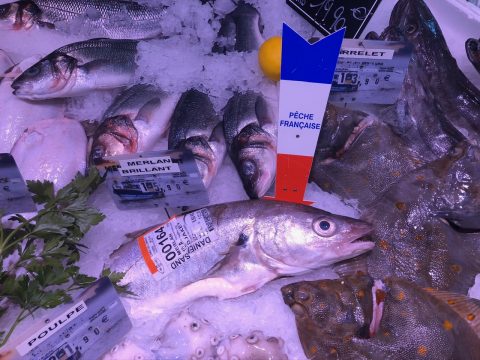
<A small fishmonger in Paris labels the “French fish”, which have high value and are greatly appreciated by French consumers>
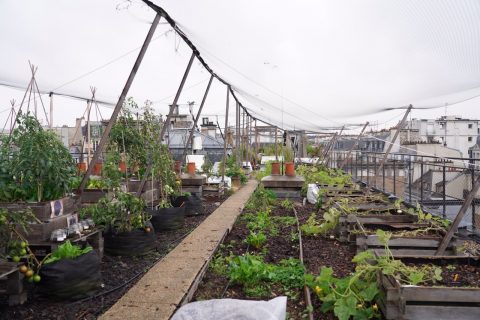
<A roof-top experiment field in Paris. City farming reduces distribution distance and has become trendy in France>
Charles claims that the key to Asia’s food safety and security is in “traceability”. Unlike the EU, where one standard can be easily set up and adopted, the system in Asia is more diverse and chaotic. Asian farmers also have their own value chains, but consumers cannot clearly trace these added values. That is why he aspires to design a traceability platform that is adaptable to the needs of Asian smallholder farmers. “I wish that not only limited expensive products, but all distributed products, should be produced and delivered to consumers in a sustainable way.”
WORDS FOR NEWCOMERS
After joining IPADS with a background completely unrelated to agriculture, everything was new to me. Compared to the other students, I didn’t have enough knowledge in the given subjects. However, due to my unique background, I have been able to examine issues from a different angle. I encourage students in the agricultural field to embrace and rethink research from a more diverse perspective. For example, developing a different opinion from an ecological and agricultural perspective when it comes to production yield. It’s also interesting to see engineers design super fancy robots for cultivation that might not be scalable in the real world.
The integration of imagination for design, a makers spirit for engineering, and knowledge from multiple disciplines can bring about the agricultural revolution, which I believe is the mission for IPADS. We will gradually forge the path for the future. Value-added in agriculture should not be all about marketing, but rather a steady and sophisticated process, with practical applications to connect the world.
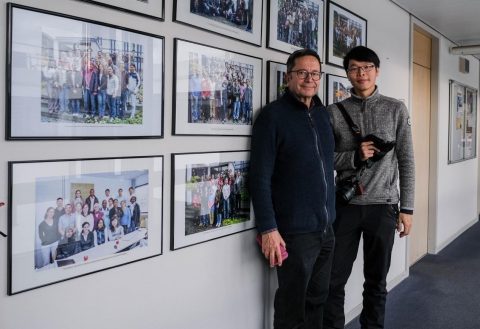
<Charles with Professor Guenther Manske at the Center for Development Research (ZEF) at the University of Bonn, Germany, the partner institute of IPADS>
FUTURE PLANS
Recently, the structure of traditional and conventional industries in Agriculture, Fisheries and Logistics has been transforming. Apart from the fancy and high-tech solutions, such as the integration of AI or blockchain technologies, I would like to focus on infrastructure, including low-tech solutions and innovation strategies for existing operating systems. I believe, with the support of modern technology, we can resolve problems using the following principles: keep it simple and straightforward, and anticipate the Belle Époque of food. The key to innovation for these industries is bringing in more ideas and people of interdisciplinary mind. Another big picture idea in the future is to introduce Taiwanese food to the world.
<PROFILE>
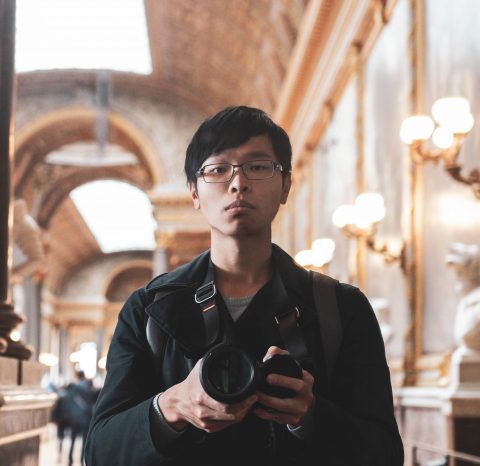
Name: Lin (Charles) Kaigen
Country of origin: Taiwan
Laboratory: International Agro Informatics Laboratory, International Program in Agricultural Development Studies (IPADS)
Favorite pastime in Tokyo: Eating ramen, going to the onsen, enjoying the safe and amazing city of Tokyo
Charles’ research activities in France are financially supported by the “Study Abroad Program” of the Graduate School of Agricultural and Life Sciences, The University of Tokyo.
<Interviewed by Noriko FUJIMOTO, IPADS Office>